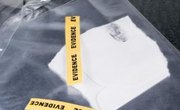A police department’s Special Weapons and Tactics team is an elite group of police officers highly trained to respond to incidents outside the scope of standard police work. A SWAT team may handle hostage situations, respond to terroristic threats, participate in covert operations or protect visiting dignitaries. To become a SWAT officer you must start out as a police officer, which can require a bachelor's degree. You’ll want to take courses that support a degree in criminal justice.
Introduction to Criminal Justice
Pursuing a degree in criminal justice usually begins with an overview of the field of criminology. An introductory course will provide you with the foundation you’ll need to take more advanced topics and training down the road. In these courses, you’ll learn statistical and historical information about crime, what causes criminals to act and what patterns are inherent in criminality. You’ll be introduced to the field’s terminology, and learn about the processes and functions of the criminal justice system.
Introduction to Law Enforcement
An introductory course in law enforcement will teach you about the organization, functions and administration of a typical police department. While the course you take may be specific to your own state’s policies and procedures, you will likely learn the policies and procedures typical to most standard police operations, including how the court, correctional and juvenile justice systems function and process criminals.
Core Courses
As part of your criminal justice training, your college may require core courses related to specific issues you’ll likely encounter as a police officer or SWAT team member, including terrorism, cybersecurity, white-collar crime, patterns of violence and victimization, and juvenile delinquency. You also may be expected to take research-based courses on the history of law enforcement and the legal system. Required courses will depend upon your program, so be sure to check a college's degree requirements before making a decision.
Field Placement
As you progress in your program, you may be required to participate in a field placement or internship. In this course, which usually occurs your senior year, you’ll be able to put into practice some of the knowledge you’ve acquired thus far in your studies. Field placements typically are tied together with classroom instruction to further enhance your studies, and usually require a formal application. Depending on your degree requirements, you may be placed with a federal, state, county or municipal agency, such as a police department, court system or correctional facility, to complete your internship.
Related Articles
References
Writer Bio
Jennifer Brozak earned her state teaching certificate in Secondary English and Communications from St. Vincent College in Latrobe, Pa., and her bachelor's degree in journalism from the University of Pittsburgh. A former high school English teacher, Jennifer enjoys writing articles about parenting and education and has contributed to Reader's Digest, Mamapedia, Shmoop and more.










